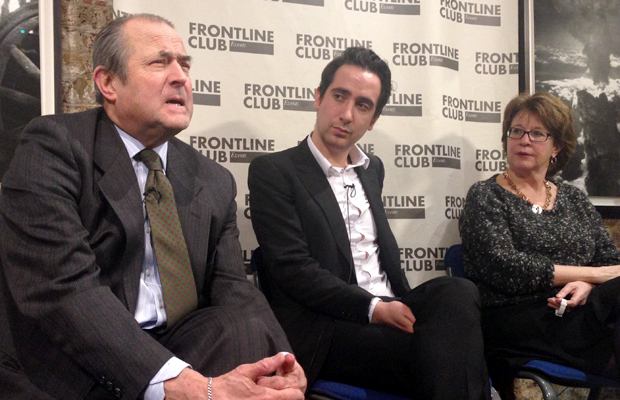Iran: A New Chapter That is Yet to Start
Palmer started by asking the panel if there had been change for the good since the election of Rouhani?
British-Iranian Emmy award-winning foreign affairs journalist, Ramita Navai said:
“He is the man who can change things, he’s a real insider. . . . He really knows how to negotiate the hardliners. . . . He’s also of course in favour with the big man . . . the supreme leader.”
Kelly Golnoush Niknejad, founder and editor-in-chief of the award-winning Tehran Bureau, hosted by The Guardian said:
“The initial optimism that came with Rouhani’s win is definitely wearing off. When he released a group of prominent political prisoners before his UN trip hope went up that he was going to free [former presidential candidates Mehdi] Karoubi and [Mir Hossein] Mousavi and his wife [from house arrest] and when he didn’t do that . . . they were hoping that would legitimise an election they had taken part of.”
Packed house for tonight's Iran debate as our panel discusses the changes we have seen in the country pic.twitter.com/8JuPBJPuYW
— Frontline Club (@frontlineclub) January 28, 2014
Shashank Joshi, a research fellow at the Royal United Services Institute (RUSI), said that the nuclear deal, which was implemented on 20 January, would be the start of Iran becoming more economically viable internationally, but it is not the end:
“The so called ‘Joint Plan of Action’ . . . it was the biggest breakthrough for 10 years in the nuclear dispute. . . . [But] going from an interim deal to a final deal is very, very hard. . . . The one thing that unites those who hate the deal and those who love the deal is that both have a propensity to see this as the thin end of a wedge to a bigger rapprochement. . . . [Rouhani’s] mandate is to ease reconciliation for economic reasons, economic renewal, it is not a mandate for unconditional friendship with the west.”
@shashj on converging strategic interests btwn the West and #Iran: "Iran never easy to deal with even with mutual interests" @frontlineclub
— Julia Macfarlane (@juliamacfarlane) January 28, 2014
Iran’s success depends on economic success but the west has a dilemma. Former British ambassador to Iran (2002–06) Sir Richard Dalton said:
“The outside world . . . has got a genuine dilemma because the Iranian regime is not one which one would want to see strengthened. One would want to see aspects of the way it treats its own people and the way it behaves in the region weakened, frankly. . . . But at the same time, non-proliferation of nuclear weapons and above all ensuring that the Iranian programme will not be misused in future is such a high priority issue that there are certain features that are going together with a solution which include boosting Iran’s growth rate. . . . In justification, an Iran that is prospering is an Iran that is more likely to reform long term.”
How much domestic pressure is there for the government to affect change, Palmer asked. Arron Reza Merat of the Economist Intelligence Unit said:
“Your question presupposes that there is a strong . . . democratic apparatus to press politicians to do anything and in Iran . . . the elite run Iran, the elections though do have some democratic elements in them are really just changing fractions within the original systems.”
An audience member asked whether the reformists have any hope in having an effect on the system. Merat said that there was hope in Rouhani’s relationship with the Supreme Leader and political hardliners:
“The one hope I think that the reformists have is that they’ve got a reformist-backed president who has the support of not only the reformists but the hardliners and this hasn’t happened since [former president Akbar Hashemi] Rafsanjani’s first term [in 1989]. . . . Ever since then Iran has been utterly polarised . . . nothing happens in Iran unless you have both sides on board.”
A final question from the audience asked what would be the significance of having Mousavi and Karoubi released? Dalton said:
“From my perspective I can’t imagine the streets of Tehran would be filled with people supporting them the day they came out. People are a lot more practical than that at the moment.”
Navai said:
“It is symbolic. It will signal that Rouhani has the power to change, the power to release them. . . . They are still perceived as a threat . . . it’s a fear apparently that if they do release them that the reformists, however dormant they are, will be strengthened before the parliamentary elections [in 2016] and of course the hardliners are very keen that Rouhani doesn’t gain ground in the parliamentary elections.”
Watch or listen back here:

